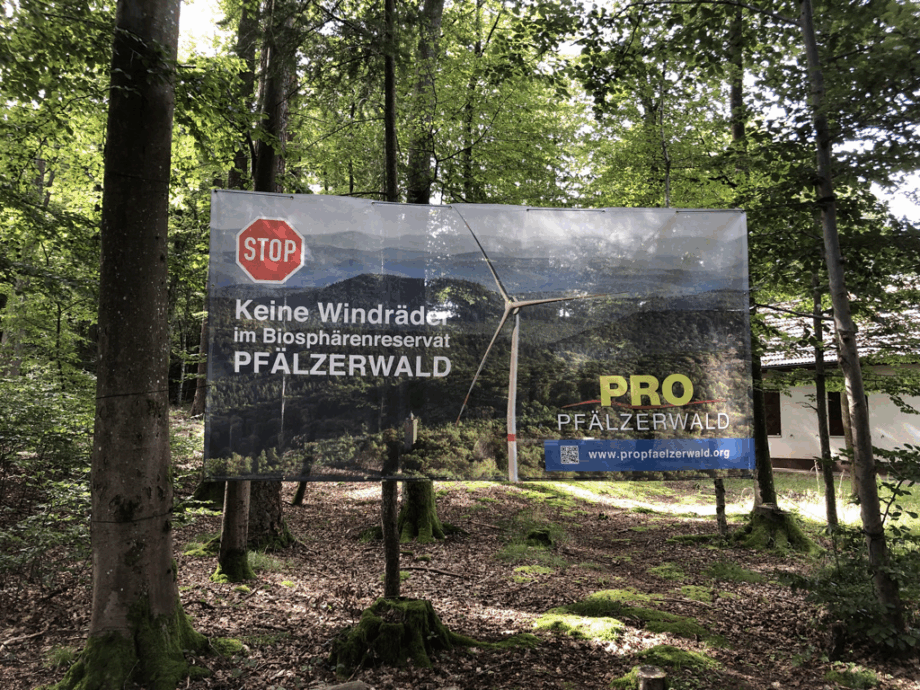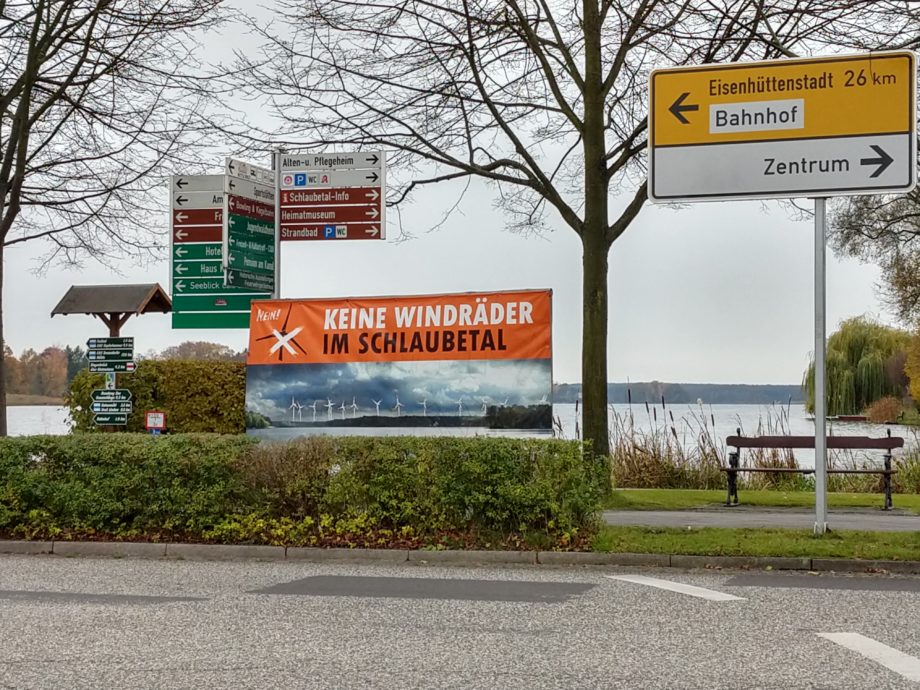Authoritarian Publics
Anthropological Perspectives on the New Right in Germany
In recent years, right-wing politics and discourses have gained substantial traction in Germany, mirroring broader trends across Europe and globally. While anthropological research has focused on far-right movements and on how anthropological practice contributes to the making of the “uncomfortable” or “repugnant other,” studies on broader, everyday forms of political mobilization and sense-making remain underdeveloped. Our plenary session, Authoritarian Publics: Anthropological Perspectives on the New Right in Germany, brings together researchers working ethnographically in diverse German-speaking contexts to ask: How do authoritarian and right-wing ideologies permeate public and private life? How do they reshape the contours of political belonging, civic participation, and social legitimacy?
 Fig. 1 Opposition to wind power in rural Germany (Pfälzerwald, Rhineland-Palatinate), photograph by Mario Krämer
Fig. 1 Opposition to wind power in rural Germany (Pfälzerwald, Rhineland-Palatinate), photograph by Mario Krämer
This panel brings together Nitzan Shoshan, author of “The Management of Hate: Nation, affect, and the governance of right-wing extremism in Germany,” whose research has focused on right-wing youth in Germany and, more recently, on the social and political life of Heimat among diverse milieus in Brandenburg; Konstanze N’Guessan, whose work explores trolling and memetic activism as “ludic fascism” in post-digital political publics in Germany and who also engages in outreach and prevention work; and Mario Krämer, who investigates the nexus of environmental activism, traditionalism and (political and cultural) belonging with a focus on nature conservation and opposition to wind power in rural Western Germany. The conversation is moderated by Simone Pfeifer, whose work addresses memetic appropriations, violence and digital practices, with a focus on methodological, ethical and moral challenges of conducting research in contested political fields.
Together we will examine how the New Right in Germany has expanded its reach and normalized authoritarian ideals within mainstream spaces, fostering what can be termed “authoritarian publics.” It’s important to understand authoritarianism not just through traditional right/left binaries, but also in relation to contemporary formations, which often resist clear political categorization. We will discuss the nuanced and often insidious processes of political Un/Commoning – or the creation and disruption of shared spaces and values – as well as the (violent) effects of such discourses on social cohesion, public trust, and marginalized communities. By interrogating how ordinary, centre-right forms of belonging and mobilization contribute to these shifts, the plenary aims to uncover the mechanisms through which authoritarianism becomes embedded in everyday life.
Grounded in ethnographic case studies focusing on different geographic and media locations within German-speaking contexts, this panel seeks to provide a complex understanding of authoritarianism’s spread and its complex intersections with race, gender, class, and historical memory. By examining how the New Right navigates and shapes German-speaking publics, this discussion will contribute to broader anthropological debates on nationalism, political identity, and the evolving nature of “common” spaces within democratic societies.
 Fig. 2 Müllrose street signs, photograph by Nitzan Shoshan
Fig. 2 Müllrose street signs, photograph by Nitzan Shoshan
This plenary is not meant to offer definitive answers. Instead, it is an invitation to think together and to open up a conversation across positions and perspectives. We invite participants and readers to think critically with us along the following questions:
- When to use what labels and to what end?
We will explore the distinctions between labels such as centre-right, far-right, extreme right, neo-nationalist, fascist practices, and critically reflect on when and why we choose to use these terms. What analytical or political work do these labels do? What are their limitations? This discussion becomes especially urgent when the “far right” is no longer distant, but increasingly present, embedded in everyday life, among colleagues, neighbours, friends, or even family.
- What does Heimat mean today, and for whom?
How can we make sense of and unpack the emotionally and politically loaded term “Heimat”? What kinds of social and political projects are mobilized in its name? Is it simply a nationalist trope, or does it also express forms of localism, regional belonging, or even ecological concern, such as efforts to protect local landscapes? Why does it continue to resonate so strongly? Can Heimat be understood as operating across different and shifting scales: from the hyper-local to the national? If so, how do these scales interact or conflict with one another?
Given its deep ambivalence, at once emotionally powerful and ideologically fluid, how should we engage with the term analytically? What risks are involved in its use, especially when it is employed to flatten differences or exclude? If Heimat is used across both right-wing and progressive discourses, might it still offer a productive site for critical inquiry? What kinds of belonging, exclusion, and boundary-making do authoritarian discourses/publics perform? Who gets to be part of the “common,” and who is actively removed or denied participation?
- What are the responsibilities of anthropology/anthropologists working in these fields? What are the limits?
Increasingly right-wing actors appropriate scholarly language to legitimize their exclusionary political agendas. How do we communicate complex ethnographic insights without simplifying or moralizing, yet without offering platforms for harmful ideologies? What happens when terms like identity, culture, or sovereignty are repurposed by movements such as the Identitarian Movement? What are the implications for scholars when academic vocabulary becomes contested, co-opted, or even weaponized in public discourse? How should we respond when our own conceptual tools are mobilized in the service of authoritarian or exclusionary ideologies? What are the limits of ethnographic or collaborative research in these fields?
We look forward to continuing the dialogue with each other, and with you during the plenary!































